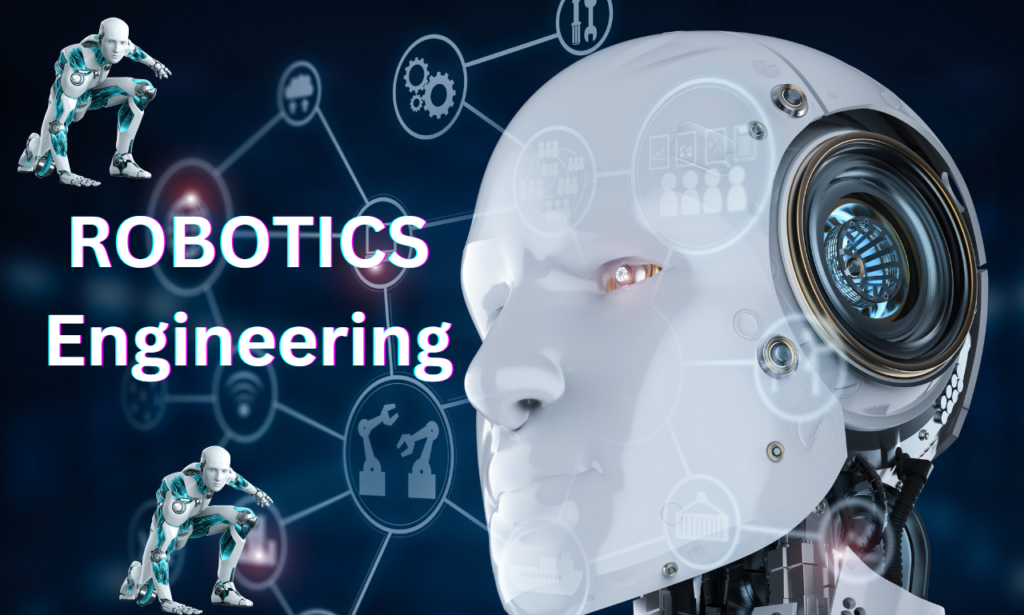Robotics Engineering: The Future of Automation and Innovation
The rapid technological development of our contemporary era exists thanks to Robotics Engineering which represents one of the principal transformative fields in modern industry. Robotics engineering builds intelligent machines by designing while programming and constructing them for executing standard human responsibilities. The future builds up through robotics because this technology applies to industrial automation and healthcare alongside space exploration.
What is Robotics Engineering?
Robotics Engineering adopts engineering recommendations from mechanical technology and electrical systems accompanied by computer science attributes for designing automated intelligent contraptions. Modern machines referred to as robots perform different operations with minimal human supervision. The main mission of robotics engineering focuses on producing technological systems that boost operational effectiveness and precision combined with protective qualities throughout various business sectors.
Robotics engineers create robotic systems by developing their operational programs and establishing solutions for effective environmental interaction. Computers are used across diverse industries starting from defense down to entertainment and manufacturing up to healthcare.
The Key Components of Robotics Engineering
Robotics Engineering exists as an engineering discipline that needs careful examination of its fundamental elements. Robotics system development merges different engineering disciplines into a single product development process.
1. Mechanical Engineering
Roboticists who specialize in this field concentrate on creating robot components that include physical outlines together with their motions and structural systems. Through materials science and mechanics application engineers design robots for durability and functional performance. The robotic structure consists of robotic arms in addition to joints and locomotion systems that enable robots to carry out targeted operations.
2. Electrical Engineering
Robotics depends on circuits sensors and control systems that manage robotic directional processes while receiving power from these elements. The main task of electrical engineers involves uniting robot components to reach operational objectives. Scientists develop powering solutions and wiring systems with sensing capabilities to give robots the ability to understand their operating environment.
3. Computer Science & AI
Robotics entirely depends on quality programming practices. Through artificial intelligence and machine learning technologies, robots develop autonomous learning abilities that enhance their performance of sophisticated operations. Through developed algorithms, engineers equip robots to accomplish intelligent processing of data and pattern recognition and decision-making capabilities.
4. Control Systems
Robot systems provide capabilities for robots to work with the environment while processing information and carrying out commands with accuracy. The field of control engineering develops methods to maintain robot performance of written directives together with operational environmental reactions.
Applications of Robotics Engineering
The fields of numerous industries display the influence of robotics engineering since these innovations introduce operational transformations that boost various domain-specific efficiencies.
1. Manufacturing & Automation
Through automated factory production, robots have transformed industrial manufacturing into a more efficient system that leads to cost reduction. Assembly lines with robotics systems operate by employing robotic arms to create products with optimum speed as well as exceptional accuracy that results in improved output and near-zero production mistakes.
2. Healthcare & Surgery
Medical professionals achieve precise minimal invasive surgical procedures through the employment of surgical robots. The robots eliminate human mistakes resulting in better surgical outcomes. Through robotic technology, patients obtain improved outcomes that enhance their quality of life in prosthetics and rehabilitation alongside elderly care interventions.
3. Space Exploration
The space exploration activities of NASA along with other space agencies depend on robots that explore planets and gather scientific information. Through harsh robotic rovers named Curiosity and Perseverance scientists can explore scarce extraterrestrial planets while receiving useful data transmission from space. The mission to explore deep space would become straightforward to accomplish through the use of these machines.
4. Agriculture
Through automation, robots perform tasks for crop planting while they also perform harvest functions along with regular field monitoring. Drones and AI-based farming equipment boost agricultural production while minimizing expenses through automated operations that operate with exact water and fertilizer measurements to achieve sustainable agricultural practices.
5. Defense & Security
Military robots function in three key missions which include surveillance tasks bomb removal services and tactical battle functions. The deployment of self-operating machines completes dangerous military assignments to protect soldiers from injury while boosting operational achievements.
6. Consumer Robotics & AI Assistants
Advanced consumer robots that operate through artificial intelligence have brought increased convenience to homes by introducing smart home assistants together with robotic vacuum cleaners. Daily operations use these robots which integrate artificial intelligence to execute common jobs thus showing robotics play an increasing role in everyday existence.
Challenges in Robotics Engineering
The continued expansion of robotics engineering meets various hurdles during its growth.
1. High Development Costs
Robotics system creation demands major financial resources for research together with product design and manufacturing development. Robot implementation remains exclusive to specific industries because of expensive development costs.
2. Ethical Concerns
The expansion of robots into human work domains creates problems regarding displaced employment together with moral duties in robot operations. Economic and social policies extensively debate how automation affects employment levels.
3. Technical Limitations
The field of robotics has developed substantially but researchers need to resolve several issues regarding AI decision processes alongside power consumption requirements and robotic-human connection technologies. Engineers pursue constant research efforts to boost the learning abilities of machines as well as improve battery longevity to develop self-operating robots.
4. Security Risks
Security threats to AI-driven robotics become an essential priority while more organizations depend on robotic technology. Strategies to protect robots against cyber attacks and hacking need to be established because their safe deployment must occur within secure defense and healthcare-related industries.

Future of Robotics Engineering
The robotic engineering sector shows great promise because artificial intelligence alongside nanotechnology and machine learning technologies lets robots reach new operational heights. Robotic technology including humanoid robots AI-powered assistants and autonomous vehicles has introduced an innovative new way for humans to use technology.
The technology will achieve full autonomy through self-learning abilities and independent complex decision-making functions that do not require human supervision. AI-driven enhancements will propel robots to deliver escalating contributions to medical fields as well as logistics operations and space exploration. Smart robotic systems will benefit from the IoT integration with robotics to work in connected environments.
One exciting field of development links robotics engineering to biological systems through biomechatronics research. Current scientific research advances exoskeletons and prosthetic limbs toward functioning as efficient replacements for lost natural body parts for those living with disabilities.
How to Become a Robotics Engineer?
Your future lies in robots because the combination of your enthusiasm for both automation and problem-solving and futuristic technology interests makes robotics engineering your best path toward building the future. The following sequence details the process of becoming a robotics engineer:
1. Obtaining a Degree Represents the Base Requirement for Starting in Robotics Engineering or its Related Fields Including Robotics Engineering Electrical Engineering Mechanical Engineering and Computer Science.
2. The development of practical skills through robotics projects can be achieved by joining competitions and taking part in internships and practical work experience.
3. A robotics engineer should develop expertise in programming languages including Python together with C++ and Java.
4. Your advanced robotics knowledge will improve when you understand concepts from AI algorithms and neural networks.
5. A master’s degree or Ph.D. enables candidates to obtain specialized research jobs or research positions in robotics engineering.
Conclusion
Robotics Engineering leads the world toward innovative significant systems and safer operations as well as operational efficiency. Technology advancement will make robots play an increasingly vital role throughout different industries. Future technologies will develop including AI-driven humanoid robots alongside self-driving drones that will transform transportation systems.
The field of robotics engineering provides endless opportunities to work with frontier innovations because of your technology and innovation interests. Automation represents the present and future direction of the world which makes robotic specialists essential for developing this trajectory.
FAQs
What is Robotics Engineering?
Robotics Engineering is a field that designs, builds, and programs robots for various applications, including manufacturing, healthcare, and automation.
What do Robotics Engineers do?
They design, develop, and test robotic systems, integrating hardware and software to perform specific tasks.
What skills are required for Robotics Engineering?
Key skills include programming, mechanical design, AI, electronics, and problem-solving.
What are the career opportunities in Robotics Engineering?
Careers include robotics design, AI development, automation engineering, and research roles in industries like healthcare, automotive, and space exploration.
What are the best programming languages for Robotics Engineering?
Common languages include Python, C++, Java, and ROS (Robot Operating System).
How do I start a career in Robotics Engineering?
Earn a degree in robotics, computer science, or mechanical engineering, gain hands-on experience, and work on robotics projects.
What industries use Robotics Engineering?
Industries include healthcare, manufacturing, defense, space exploration, and agriculture.
What is the future of Robotics Engineering?
The field is growing rapidly, with advancements in AI, automation, and human-robot collaboration shaping the future.







